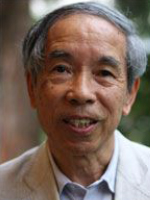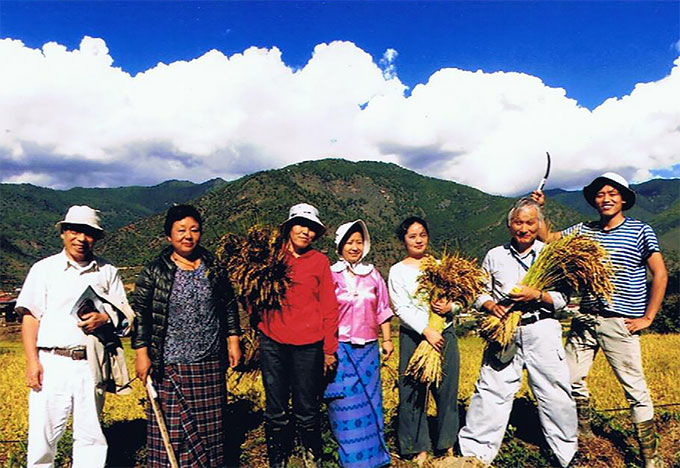 Food And Rights Talk is a series of interviews with PAN Asia Pacific (PANAP) partners across the globe to find out the situation of rural peoples, in relation to food security and human rights, amid the COVID-19 pandemic.
Food And Rights Talk is a series of interviews with PAN Asia Pacific (PANAP) partners across the globe to find out the situation of rural peoples, in relation to food security and human rights, amid the COVID-19 pandemic.
This week, we talked with Koa Tasaka, a steering council member of PANAP and former director of the Asian Rural Institute based in Tochigi, Japan.
PAN Asia Pacific (PANAP): What is the extent of the COVID-19 pandemic in Japan?
Koa Tasaka: The pandemic problem in Japan started in February when the Diamond Princess cruise ship arrived from the worldwide tour, and it was found later that there were 723 people infected by the virus. Right now, the total number of infected people is 18,700, and the number of deaths is at 972. Compared to many other countries that is still a small number. But for us it was a really big shock.
PANAP: How did the Japanese government address this pandemic?
Tasaka: There is a group of medical experts who gives advice to the government, then the policy is made according to their advice. Testing is done by medical teams that have now been established all over Japan. So whenever someone gets infected they will immediately be hospitalised and isolated from other people. The numbers have decreased since the pandemic began, but now I think the second wave of the infection is starting. In Tokyo, everyday there are around 50 people being tested positive for COVID-19.
PANAP: What have been the effects of the pandemic on Japanese farmers?
Tasaka: The large number of victims are concentrated in the big cities, such as Tokyo, Osaka, and Sapporo. In the rural areas, there are much less victims, and in some prefectures there has been zero cases. The sectors that have been most affected are the part-time workers in restaurants and shops which were told to close for 3 months. They lost their income, and many of them have no way to get food. So some NGOs provide food for them. Also affected are the foreign workers from Bangladesh and other countries. They have very big problems—some of them lost not only jobs but a place to stay. So NGOs are also helping them to find place to stay and some food to sustain them. Japan is rather different compared to other countries in Asia, in the sense that farmers are not so much affected by the pandemic. But the people in the big cities, especially workers, are highly affected.
PANAP: Have there been any food supply chain disruptions?
Tasaka: We can still find enough food supplies in shops even during the peak of the pandemic. The farmers were also allowed to have access to markets to sell their products. Although from March to May, school was closed so the school lunch system was stopped. So many farmers producing a huge amount of food for school lunches suddenly cannot sell them. Some NGOs are utilising this food to help those who have lost jobs in the big cities.
PANAP: Would you say that food security has been affected by the pandemic?
Tasaka: Food security is immediately affected by losing your job or income. In Japan, unless you have money you cannot get any food. It’s very, very difficult. In the rural areas, they have something to eat because they are producing all kinds of food. There is no hunger problem in rural areas. But in big cities there are so many people who suffer because they cannot eat three times a day.
PANAP: Is there government aid for those who have lost their jobs because of the pandemic?
Tasaka: Right now, the Abe administration is so slow to respond to that need. The government has very quickly organised a medical response—health experts collaborate day by day so all those who are infected are hospitalised and then tested. Suspected cases can also stay in some hotels which have provided space. In that respect, our government is doing a good job. But those who are at the bottomline of the economic system really suffer. Although the government has decided to give JPY 100,000 for all people who have registered in the local administration office, it is not enough. It also excludes foreign workers staying for temporary work in Japan. So they are really suffering. The government is eager to help big businesses in order for them to avoid bankruptcy. But they have no plans for those who are suffering from hunger in Japan, where many people are rich but some people are very, very poor. JPY 100,000 is not enough for those people who are very seriously hit by this pandemic and have no income at all. These are mostly part-time workers, whose numbers have been increasing in recent years. The government is not eager to look at their reality and do not have any policy to help them.
PANAP: You work with organic farmers. Do you think there are advantages of being an organic farmer during a pandemic?
Tasaka: Even before the pandemic, we started a school lunch system that promoted organic rice instead of bread made from imported wheat from the US, which is highly contaminated by organophosphate pesticides. Everyday, children are eating this contaminated bread all over Japan for the past 50 years. But we now have a movement to feed children safe food through organic rice. Although in Japan, the number of organic farmers is very small—just 0.5% of farmers, which means 99% use huge amounts of pesticides—we are trying to promote organic farming through the school lunch system. Because even mayors who are not progressive agree with us that children should have safe food for lunch. Through this movement, we are now training farmers in organic rice production and many farmers now have an incentive to change from conventional to organic farming.

PANAP: Is safe food more important now for children to have stronger immune system and better health?
Tasaka: Yes. Although until now the infection and death rate of COVID-19 among children is minimal, I think that if children are provided with safe food, it will help them get better immunity against these types of pandemic. Even older people can have a stronger immune system by eating healthy food, and have much less probability to die because of COVID-19.
PANAP: What do you think are the changes needed in agriculture and food policy to ensure food security?
Tasaka: I think the biggest problem in Japan is that we are depending too much on food imports. We are importing 60 percent of our food in Japan. That means the self-sufficiency rate is just around 40 percent. Wheat, for instance, is 90 percent imported. Because of too much wheat imports, children have gotten used to a bread-eating habit. So rice is produced every year by our farmers but they are not are not making enough income for selling rice. Another example is soybeans. Before the Second World War, Japan was 100 percent self-sufficient in soybeans, which is used in miso, tofu, and most of the daily food of the Japanese. But now soybean production is limited and there are so much soybeans coming from China and Brazil. There is also the problem of genetically-modified soybeans. NGOs have been rejecting the import of GM soybeans and so far have been successful in their resistance. The only solution is local food production and consumption. We must promote local food production and consumption so that we don’t need to rely on imports and pay so much money to buy food that we can produce ourselves.
PANAP: What can other countries learn from the relatively successful containment of COVID-19 in Japan?
Tasaka: Our medical teams put a lot of effort in establishing the system of testing for COVID-19. Some of the people who are infected have no symptoms, so it’s very difficult to identify who has the virus. So the top priority should be the testing system, then isolating infected people while the virus is still active. I think because of the effort of medical teams all over the country, from Hokkaido to Okinawa, each provincial government has set up a system for testing, isolation, and treatment. So we are able to achieve a high recovery rate. It is the way to fight the virus, which unfortunately top leaders in US and Brazil are not doing. It is very tragic for the people there that the government does not do anything to protect them.
PANAP: So the strength of the public health system is crucial? Do people get free treatment?
Tasaka: Yes, those who get COVID-19 are given free medical service. Like in Bhutan and Cuba, free medical service for patients is essential to protect the people, especially the poor people.###








Discussion about this post